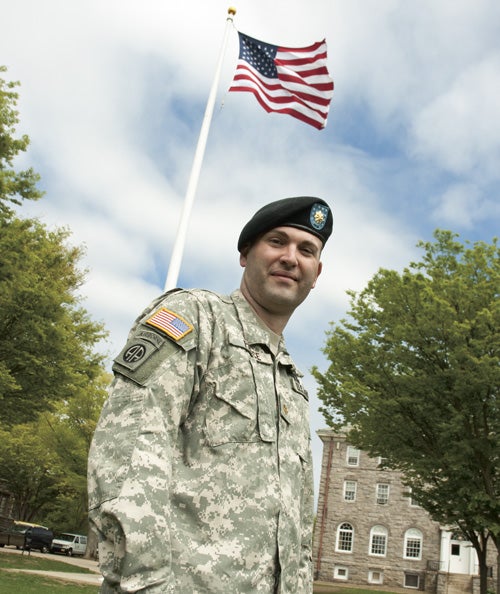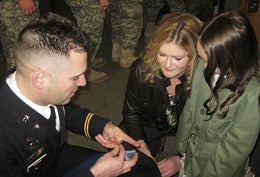Helping Soldiers in a Major Way

Little did Matthew Pierce ’01 know on the day he graduated with a psychology degree and was commissioned a second lieutenant in the U.S. Army that the world would change dramatically within a few months and shape his life.
Nor did he realize that 10 years later he would be a URI student again, pursuing his master’s and doctorate degrees in clinical psychology. But this time, it would be as a recently promoted major.
Pierce was stationed at Fort Bragg, N. C., when terrorists hijacked four commercial planes and attacked America. Within a year-and-a-half, he was part of the initial invasion of Iraq working as medical platoon leader for the 1-325th Airborne Infantry Regiment, 82nd Airborne Division for 11 months.
When he returned from his deployment, he was assigned as a human resource officer and eventually as a company commander with the 28th Combat Support Hospital at Fort Bragg.

“During my time as a company commander I was able to see the effects of post deployment issues, as well as day-to-day stresses on soldiers and their families that include but are not limited to domestic violence, substance abuse, sexual assault, PTSD, and all the little things that add up as well,” says the 35-year-old graduate student. “While many commanders saw their troubled soldiers as the worst part of their job, these individuals inspired me to want to contribute more to the military.”
Pierce’s journey to graduate school included an assignment as a medical operations combat development officer for two years at Fort Sam Houston in San Antonio, Texas.
Not surprisingly, his deployment and experiences since have influenced his educational focus. He will examine post traumatic stress disorder and substance use disorders among returning veterans for both his master’s thesis and doctoral dissertation.
He counts himself lucky to be collaborating with M. Tracie Shea, a professor of psychiatry and human behavior at Brown University, and with the Providence Veterans Administration. His biggest form of mentorship comes from Mark Wood, a social psychology professor in URI’s behavioral psychology program.
Pierce hopes to finish his URI studies within the next two years and then complete a required two-year internship needed for licensure at one of the Army’s five medical centers. Based on the needs of the Army at that time, he could serve as a clinical psychologist in a variety of other positions: “My only hope is that I will be making a significant difference towards improving the mental health among those in need because our soldiers and their families deserve the best support we can provide them.”
His graduate education and Army internship obligates Pierce to an additional six years of service, extending him past the normal 20-year retirement framework. But the career solider is fine with that.
His Army career actually began three years before the Brunswick, Maine, native originally enrolled at URI. During his undergraduate studies Pierce met his future wife, Amanda Rose. The couple married between his junior and senior years and now have an 8-year-old daughter named Abbiee. The family lives in Westerly with Chloe and Rhody, their two St. Bernard dogs.
Amanda and Abbiee were present when Pierce was promoted to major this past winter. “When I found out I was being promoted I wanted to do something for my family. My daughter wasn’t old enough to remember the last time I was promoted, and I always like to involve my family in these occasions because they are what make it so special.”
Pierce asked Lt. Col. Deb Wilson, who heads the ROTC department, if his promotion ceremony could be held in Keaney, which would provide an opportunity for the cadets to question him about his experiences and educational opportunities.
“Our ROTC program definitely helped develop me into the leader I would like to think I am,” Pierce says. “My undergraduate psychology degree was just the beginning of my understanding, but it taught me enough about human behavior, social dynamics, and communication to help me in relating to and under-standing the soldiers I have been blessed to work with.”
URI’s Student Veterans
There are 310 students currently receiving veteran benefits, up from 267 last year. Some, like Major Matthew Pierce, belong to URI’s Veteran Student Association.
“We help ease the transition from military life to campus life on a peer level,” says sophomore Travis Crewdson, a U.S. Marine Corps Iraq war veteran who is president of the association. The group, which rotates meetings between the Kingston and Providence Campuses, has raised funds for the Wounded Warrior Project and the National Guard’s Adopt A Family and Operation Holiday Cheer programs. The association is open to veterans, their family members, and anyone interested in supporting veterans. To learn more, contact Crewdson at tjcrewd@gmail.com
The URI Supports Student Veterans Committee was formed in 2007. Its mission is to attract, retain, and support student veterans and to make recommendations regarding URI policies and procedures. The committee’s membership consists of faculty, staff, and students from the Kingston and Providence Campuses and representatives from Veterans Affairs offices.
“It is our pleasure to provide whatever support we can to our military and veteran students seeking an education while juggling many other responsibilities and readjusting to either life after deployment or a career as a reservist with continuous mini deployments,” says Christine Dolan, education specialist, special programs at URI’s Feinstein Providence Campus and School of Education. She co-chairs the committee with Nancy Kelley, assistant dean of Human Science and Services.
Among its many accomplishments, the committee has helped establish and staff a Veterans Office at the Feinstein Providence Campus, put in place point people in the Enrollment and Admission offices, and developed a Veterans Education Fund and a 101 class tailored to veterans. For more information, contact Dolan at christine@uri.edu. ”
By Jan Wenzel ’87
 Home
Home Browse
Browse Close
Close Events
Events Maps
Maps Email
Email Brightspace
Brightspace eCampus
eCampus


